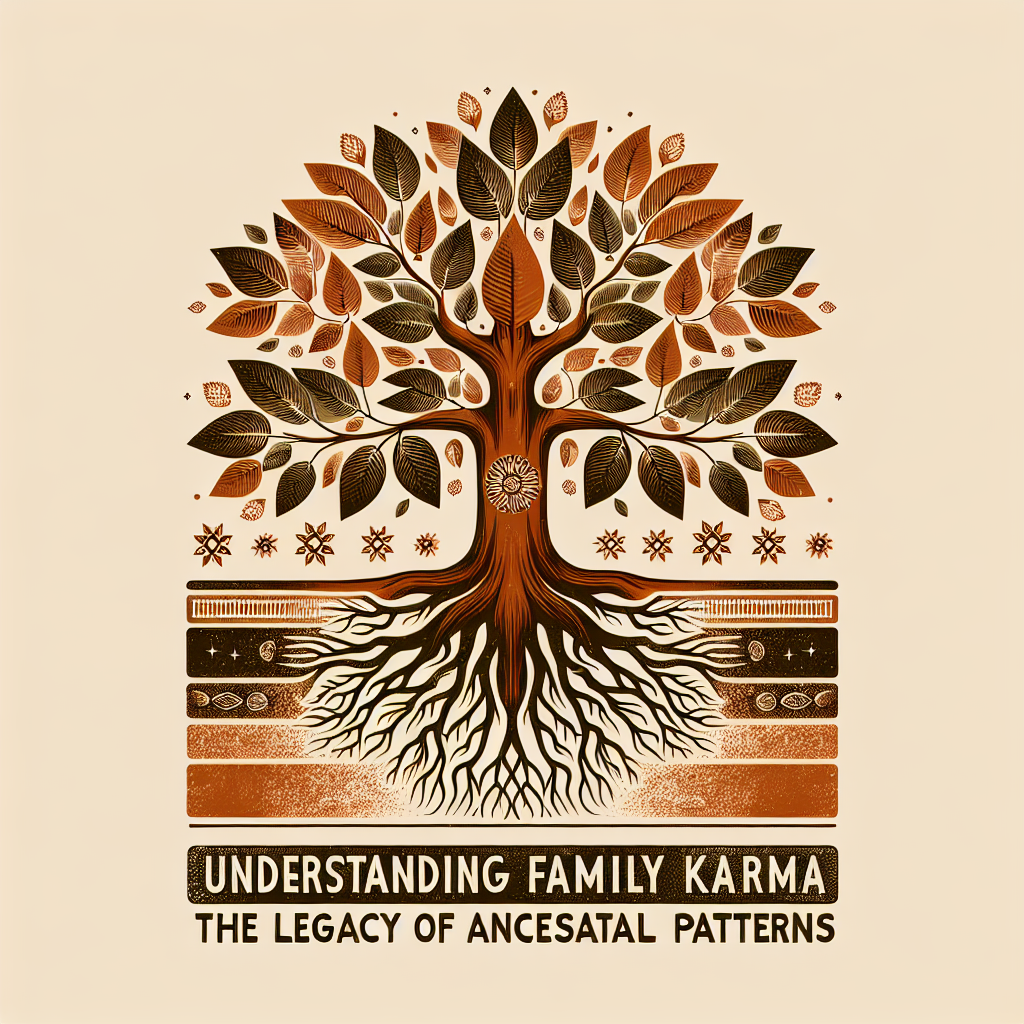Introduction to Family Karma
Family karma refers to the inherited emotional and behavioral patterns that we continue to replicate across generations. It embodies the belief that the actions and experiences of our ancestors significantly impact our lives, shaping our thoughts, feelings, and behaviors. Understanding family karma encompasses not only recognizing these inherited patterns but actively working to heal them for ourselves and future generations.
The Concept of Karma
Karma is a multifaceted concept rooted in Hindu and Buddhist philosophy, defined as the principle of cause and effect where one’s actions inevitably influence their future experiences. This idea transcends individual actions and extends into familial dynamics, establishing a legacy of emotional baggage, behaviors, and unresolved issues passed down from one generation to the next.
The Role of Ancestral Patterns
Ancestral patterns refer to behaviors, beliefs, and attitudes that are ingrained within family systems. These patterns form a collective identity, and individuals often unconsciously adhere to them, perpetuating cycles of both positive and negative traits. The exploration of these ancestral patterns leads to greater self-awareness and healing opportunities.
The Cycle of Inheritance
The cycle of inheritance within families can manifest in numerous ways, including:
- Behavioral Patterns: Certain behaviors or reactions may be replicated across generations, such as coping mechanisms in response to stress or conflict.
- Emotional Patterns: Emotional responses, like fear, anger, or love, often reflect those of preceding generations, impacting how we form relationships.
- Belief Systems: Deep-seated beliefs about oneself, love, success, and failure frequently stem from familial teachings and experiences.
- Life Choices: Choices regarding careers, relationships, and lifestyles can be influenced by ancestral expectations or unspoken family rules.
Identifying Family Karma
Recognizing family karma involves an introspective journey, demanding honesty and courage. Here are some steps to identify family patterns:
- Self-Reflection: Analyze your behaviors and emotional responses to different scenarios. Journal your thoughts and feelings to uncover patterns.
- Family History Exploration: Gather information about your family history. Engaging with relatives can reveal stories about your ancestors’ struggles and triumphs.
- Recognize Repeating Themes: Look for recurring themes in your family dynamics, such as marriage patterns, career choices, or relationships.
- Therapeutic Practices: Consider therapy sessions or workshops focusing on family dynamics to help unveil hidden patterns and beliefs.
The Impact of Family Karma on Individual Lives
The repercussions of family karma on individuals can be profound. It shapes various aspects of life, such as:
1. Relationships
The dynamics of past relationships often affect how we engage with current partnerships—fears, insecurities, and communication styles tend to echo past experiences.
2. Career Choices and Achievements
Inherited beliefs about work and success can limit or liberate our career choices. For example, if a family adheres to the belief that financial hardship is inevitable, this might discourage individuals from pursuing ambitious careers.
3. Parenting Styles
Parents often mirror their own upbringing in their parenting styles, consciously or subconsciously perpetuating cycles of behavior.
4. Mental Health
Unresolved traumas and emotional baggage passed down from previous generations can contribute to mental health issues, leading individuals to battle anxiety or depression.
Healing Family Karma
Transforming family karma is possible and begins with awareness and a commitment to change. Here are several strategies that can facilitate healing:
1. Acknowledgment
The first step towards healing is acknowledging the existence of family patterns. Understanding that these patterns play a role in our lives is critical.
2. Setting Intentions
Once family patterns are recognized, setting clear intentions to break unhealthy cycles and foster healthier behaviors is essential.
3. Open Communication
Engaging in open and honest discourse among family members fosters understanding and healing. Discussing family stories and experiences can help illuminate inherited patterns.
4. Seeking Professional Help
Therapists who specialize in family dynamics can help navigate the complexities of family karma, offering guidance and support.
5. Embracing Forgiveness
Forgiveness, both for oneself and family members, is vital in breaking free from the burdens of ancestral patterns. It allows for emotional release and paves the way for healing.
Real-Life Examples of Family Karma
Understanding family karma and its manifestations comes to life through real stories. Here are compelling examples:
Example 1: The Cycle of Addiction
In several families, addiction issues can be traced across generations. When one member struggles with addiction, it can lead to pain and dysfunction in the family unit, often causing subsequent generations to develop similar patterns. Acknowledging this pattern allows individuals to support their recovery actively.
Example 2: Financial Struggles
A family that has struggled financially for generations may instill a sense of scarcity in their children. This belief system can manifest as fear of spending and an inability to embrace financial opportunities. Recognizing and healing this belief can lead to healthier financial behaviors.
Example 3: Relationship Patterns
Individuals who grew up in families where love was conditional may unconsciously seek validation in unhealthy relationships as adults. By understanding this pattern, they can learn to cultivate self-love and healthier connections.
Cultural Perspectives on Family Karma
The concept of family karma transcends cultural boundaries, although interpretations and practices may vary:
Eastern Traditions
In Hindu and Buddhist traditions, family karma is often addressed through practices such as rituals, meditation, and yoga, aiming to cleanse ancestral patterns and invoke positive change. Ancestors are venerated, and descendants are encouraged to honor them, embodying the belief that healing family karma is a spiritual duty.
Western Psychology
In Western psychology, family systems theory focuses on healing family dynamics through therapy. This approach emphasizes the importance of understanding family roles and exploring how inherited behaviors can impact individual psychology.
Conclusion
Understanding family karma and the legacy of ancestral patterns is essential for personal growth and healing. By recognizing and examining these patterns, individuals can transform their lives and break harmful cycles for future generations. Through intention, communication, and forgiveness, we hold the power to heal not only ourselves but also the lineage that precedes us.
FAQs
1. What is family karma?
Family karma refers to the emotional and behavioral patterns that are inherited across generations, impacting individuals’ lives and relationships.
2. How can I identify my family karma?
Identifying family karma involves reflecting on your behaviors and emotional responses, exploring family history, and recognizing recurring themes within your family dynamics.
3. Can family karma be changed?
Yes, family karma can be changed. By acknowledging patterns, setting intentions, and seeking professional help, individuals can break cycles of negative behavior.
4. What are some techniques for healing family karma?
Techniques include self-reflection, open communication within the family, professional therapy, and practicing forgiveness.
5. Is family karma the same across different cultures?
While the concept of family karma is present in many cultures, interpretations and practices may vary. For example, Eastern traditions often include spiritual rituals, while Western psychology may focus on therapy.
It seems like your message is incomplete. Could you please provide more details or clarify what you’re looking for? Whether it’s a writing prompt, a discussion topic, or something else, I’m here to help!, #Understanding #Family #Karma #Legacy #Ancestral #Patterns, #Understanding #Family #Karma #Legacy #Ancestral #Patterns, 1736589782, understanding-family-karma-the-legacy-of-ancestral-patterns





